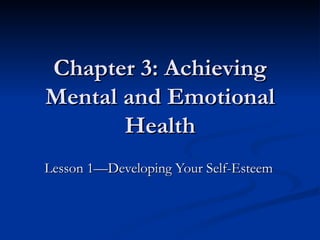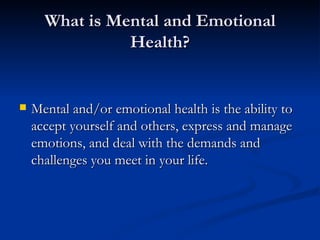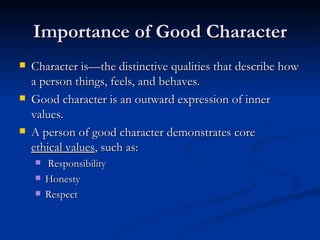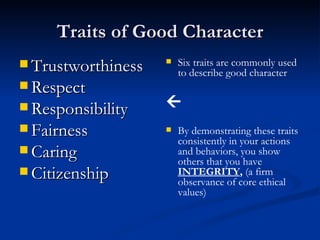Chapter 3: Achieving Mental and Emotional Health
- 1. Chapter 3: Achieving Mental and Emotional Health Lesson 1ŌĆöDeveloping Your Self-Esteem
- 2. What is Mental and Emotional Health? Mental and/or emotional health is the ability to accept yourself and others, express and manage emotions, and deal with the demands and challenges you meet in your life.
- 3. People Who Have Good Mental and Emotional Health: Health Happy Enjoy their lives Confident Comfortable with spending time alone or with others Can cope with a variety of feelings and situations
- 4. Characteristics of Good Mental and Emotional Health Sense of belonging ŌĆöfeeling close to family members, friends, teachers, and others provides you with support. Sense of purpose ŌĆörecognizing that you have value and importance as a person lets you set and reach goals. Positive outlook ŌĆöSeeing the bright side of life reduces stress and increases your chances of success.
- 5. Characteristics of Good Mental and Emotional Health (cont.) Self-sufficiency ŌĆöhaving the confidence to make responsible decisions promotes your sense of independence and self-assurance Healthy self-esteem ŌĆöhaving healthy self-esteem helps you accept and recover from difficulties and failures
- 6. Self-Esteem Developing self-esteem , or how much you value, respect and feel confident about yourself , influences the other characteristics of good mental health Trying new challenges, once you have self-esteem, can raise your sense of competence , or having enough skills to do something
- 7. Improving Self-Esteem Choose friends wisely, ones that value and respect you. Focus on positive aspects about yourself. Replace negative self talk with supportive self talk. Work toward accomplishments rather than perfection. Consider your mistakes learning opportunities. Exercise regularly to feel more energized. Accept the things you can not change, and focus your energy on changing the things you can.
- 8. MaslowŌĆÖs Hierarchy of Needs Psychologist, Abraham Maslow created a theory that explains human development and motivation. MaslowŌĆÖs model helps us understand our needs. Meeting these needs in healthy ways strengthens our mental and emotional health.
- 9. MaslowŌĆÖs Hierarchy of Needs Level 5 ŌĆö REACHING POTENTIALŌĆö Need for self-actualization Level 4 ŌĆö FEELING RECOGNIZEDŌĆö Need to achieve, need to be recognized Level 3 ŌĆö BELONGINGŌĆö Need to love and be loved, need to belong Level 2 ŌĆö SAFETYŌĆö Need to be secure from danger Level 1 ŌĆö PHYSICALŌĆö Need to satisfy basic needs of hunger, thirst, sleep and shelter
- 10. Chapter 3: Achieving Mental and Emotional Health Lesson 2ŌĆöDeveloping Personal Identity and Character * Developing your personal identity is one of the most important tasks you will accomplish during your teen years .
- 11. Importance of Good Character Character isŌĆöthe distinctive qualities that describe how a person things, feels, and behaves. Good character is an outward expression of inner values. A person of good character demonstrates core ethical values , such as: Responsibility Honesty Respect
- 12. Traits of Good Character Trustworthiness Respect Responsibility Fairness Caring Citizenship Six traits are commonly used to describe good character ’ā¤ By demonstrating these traits consistently in your actions and behaviors, you show others that you have INTEGRITY , (a firm observance of core ethical values)
- 13. Forming Meaningful Relationships Meaningful relationships are crucial to the development of your identity. Relationships provide: A support system that can help you build confidence and develop a sense of security and belonging With a meaningful relationship, family, friends and others may give you constructive criticism , (non-hostile comments that point out problems and encourage improvement)
- 14. Chapter 3: Achieving Mental and Emotional Health Lesson 3ŌĆöExpressing Emotions in Healthful Ways
- 15. Understanding Your Emotions Emotions ŌĆösignals that tell your mind and body how to react Learning to recognize your emotions and to understand their effects on you will help you learn to manage them in healthful ways
- 16. Responding to Difficult Emotions Feeling bad, or emotional, when things happen in your life is normal. These feelings however, can be managed by: Doing something to relax Channel your energy in a different direction Get away from the situation Talk with someone you trust
- 17. Defense Mechanisms Some people choose to manage difficult emotions by avoiding situations that make them uncomfortable. Defense mechanisms are mental processes that protect individuals from strong or stressful emotions and situations. You may be using defense mechanisms unconsciously as a way to protect yourself from intense emotional pain You may not be aware you are using these Although these mechanisms can help you deal with emotions for a short time, eventually you will need to work through the problem Relying on these too long can keep you from facing and/or solving what is upsetting you
- 18. Defense Mechanisms RepressionŌĆö Involuntarily pushing unpleasant feelings out of your mind RegressionŌĆö Returning to behaviors characteristic of a younger age, rather than dealing with problems n a mature manner RationalizationŌĆö Making excuses to explain a situation or behavior, rather than taking responsibility for them.
- 19. Defense Mechanisms (cont.) DenialŌĆö Unconscious lack of recognition of something that is obvious to others ProjectionŌĆö Attributing your own feelings or faults to another person or group SuppressionŌĆö Consciously and intentionally pushing unpleasant feelings out of oneŌĆÖs mind CompensationŌĆö Making up for weaknesses and mistakes through gift giving, hard work, or extreme efforts


















